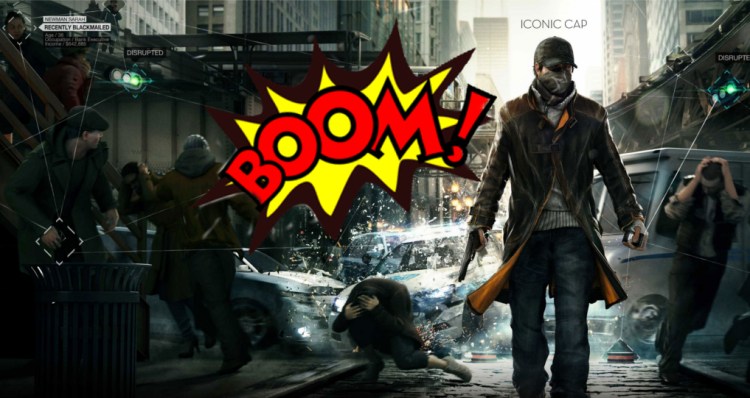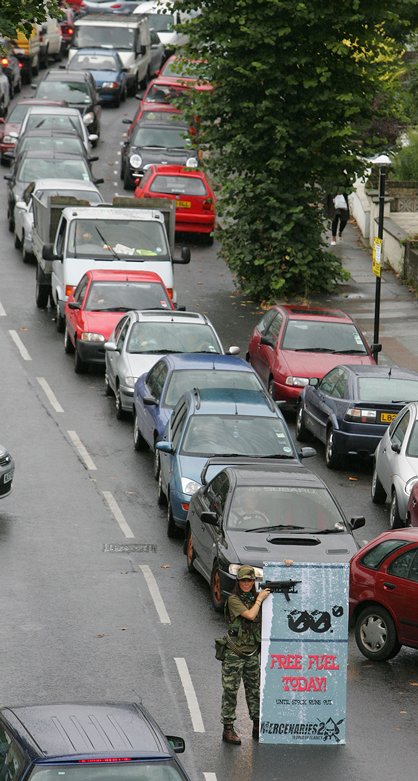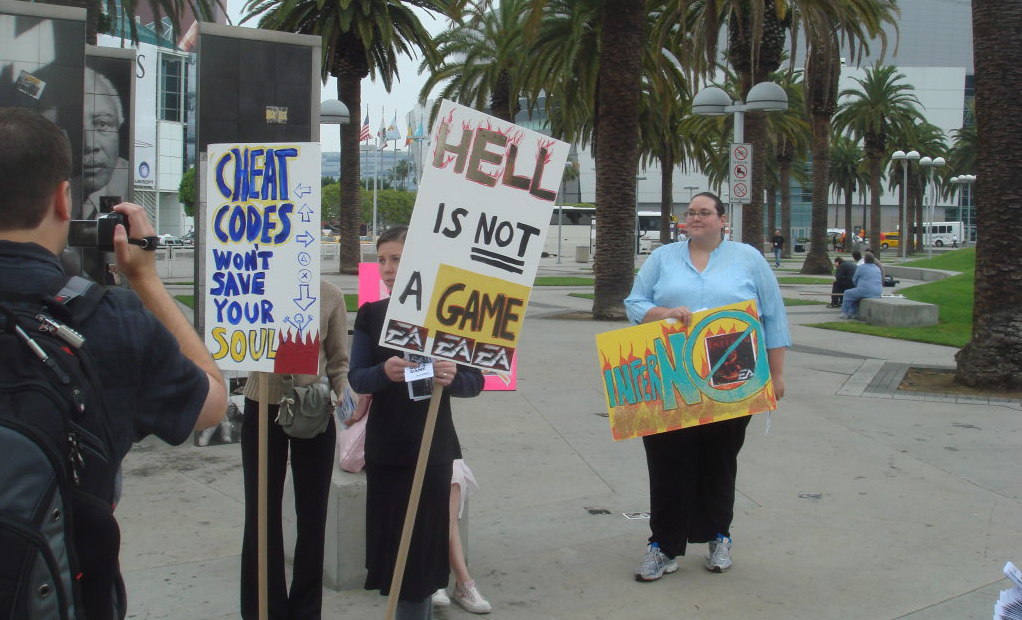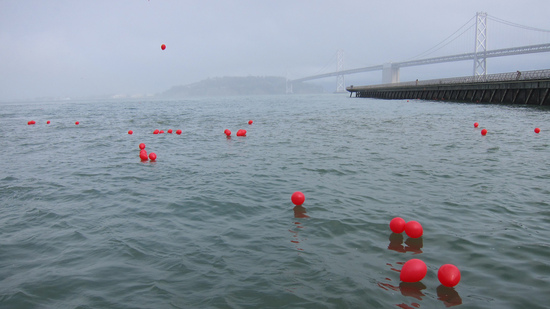If you hear a bomb scare in your town, it might be just another gaming PR stunt.
More than any other business sector, the game industry seems to revel in over-the-top, headline-grabbing antics to help shift product. In recent memory, we’ve seen a gunman stroll into a crowded bar, traffic gridlocked in London, illegal weapons sent through the mail, and a decapitated goat used as a launch party centrepiece. Just a few weeks ago, a promotional item for open-world action game Watch Dogs caused a bomb scare in Australia.
So, why does the game industry continue to use such deliberately outrageous tactics?
All publicity is good publicity. Right?
“The video game space is fiercely competitive when it comes to new launches,” said Shannon Haigh, the head of PR at U.K. agency 10 Yetis, via email. “Agencies and developers are always looking for ways to trump one another and come up with the biggest, strangest, and craziest stunts to stand out and get media coverage, but whether or not the consequences are thought about beforehand is anyone’s guess.”
So, is the saying “all publicity is good publicity” actually true?
“In most cases, but not all, we at 10 Yetis would argue that any publicity is good publicity,” said Haigh. ”While some members of the public may be put off by gravestone ads in the case of the Shadow Man 2 launch or ‘accidental’ bomb scares in the instance of Watch Dogs, there will be others that hear about the games through these very stunts and marvel at the ideas.”
But how close to the line should PR companies get?
“It’s daft to move forward with an idea that’s likely to end up involving the emergency services, albeit accidentally,” said Haigh, “but, let’s face it, controversy and a bit of drama is what hits the headlines. If a gaming PR stunt can grab the attention of potential players, even if it does cause a bit of outrage along the way, it’s probably ticked most of the boxes in my eyes
Beer, girls, and spectacle
Digital media consultant Brian Baglow takes a different view on such extreme marketing antics.
“I think the issue with the stupid, ill-conceived, and bone-headed PR stunts all springs from the same source,” he told me via email. “Trying to impress the games media — the majority of whom are young men — as conceived by games marketeers — a somewhat more diverse bunch. What do you men like? Beer, girls, and spectacle.”
Baglow argued that no thought is given to diversity “or the fact that the audience may well include people uncomfortable with corporate-financed beer or tits.”
“It’s simple, direct, and reflects the almost total lack of anything resembling tact, understanding, diplomacy, diversity or even creativity in games marketing,” said Baglow. “Take a look at the tat which is produced as giveaways in the games world and you’ll see it’s reflected throughout the entire process.”
Another PR professional, who asked to remain anonymous, pondered whether all publicity is actually good: “As a PR [person], I guess I should say yes,” they said, “but I’m not a fan of ‘edgy’ or controversial stunts. I don’t think that the PR it generates is helpful 100 percent of the time.”
The bomb scare brought about from a PR stunt for Ubisoft’s Watch Dogs stands out as a prime recent example.
“I think that causing a bomb scare was very irresponsible in these uncertain, terrorist-wary times and reflects badly on the companies involved,” they said. “Column inches for the sake of it, if you like — [it] smacks of desperation, a disregard for the public, and is a somewhat dated approach.”
Here are 12 extreme game-marketing stunts that turned bad. Or, having heard the PR side of things, possibly went really well.
1) Sony brings a dead goat to the party
The European press launch for God of War II, which took place in Athens, Greece in 2007, was a debauchery-soaked affair. It featured fire jugglers, snakes, a Kratos lookalike, and a freshly slaughtered, decapitated goat.
For reasons unknown, the U.K. Official PlayStation Magazine decided it would be a good idea to share some details with the wider public. “”How about eating still warm intestines uncoiled from the carcass of a freshly slaughtered goat?” read the article. “At the party to celebrate God Of War II’s European release, members of the press were invited to do just that.”
Media outrage followed, and a Sony statement admitted that use of the goat had been a mistake, explaining that it came from a local butcher. The company recalled the entire 80,000 print run of the magazine.
2) Radio water-drinking contest ends in death
Twenty-eight-year-old Jennifer Strange took part in a radio contest to win a Nintendo Wii for her family at a time when the console was flying off store shelves. KDND-FM radio in Sacremento had contestants drink an 8 ounce bottle of water every 15 minutes while trying not to urinate.
Strange drank nearly two gallons of water according to witnesses, and she complained of feeling ill when she left the station (having won Justin Timberlake concert tickets for placing second). Strange’s mother found her dead at home several hours later.
According to the coroner’s report, water intoxication was the cause of death. A jury eventually awarded Strange’s family $16.5 million in compensation.
KDND-FM reportedly sacked 10 employees in the aftermath of the disastrous contest.
3) Free gas stunt causes traffic chaos
Electronic Arts brought gridlock to a small corner of North London in September 2008 when it tried giving away $34,000 worth of gas to promote the launch of Mercenaries 2: World in Flames. Traffic backed up, and local residents were not amused. Nor were the police when they got called out to deal with the problem — they ended up shutting the stunt down at its halfway point.
Local politician Lynne Featherstone said: “Whilst a lucky few might have got free petrol, hundreds of residents have faced misery. Trying to re-create Venezuelan-style fuel riots on the streets of London is completely irresponsible and downright dangerous.”
4) A (gun)man walks into a bar …
Unsuspecting drinkers at a New Zealand bar dived for cover when a man with bandaged hands wandered up and pointed a gun at them. They had no idea he was actually an actor and part of an ill-conceived publicity stunt for the 2010 release of Splinter Cell: Conviction.
Armed police attended the scene and discovered that the gun was plastic when they took it away.
Senior Sergeant Ben Offner condemned the promotional effort, saying: “We consider these types of stunts to be very ill-advised and have real concerns a similar one may one day end in tragedy.”
5) EA sins for Dante’s Inferno
Electronic Arts really went to town with the marketing of its action-adventure title Dante’s Inferno back in 2009. In a PR double-hitter, the game company managed to cause offense on both religious and misogynistic grounds.
In part one, it organised a fake religious protest outside the E3 video game conference against its own game, fooling almost no one but offending some Christian bloggers.
“Instead of engaging in a shamelessly anti-Christian stunt to promote your poor excuse of a product, maybe you ought to work on making this game, you know, something better than a blatant God of War rip-off,” said Catholic Video Gamers’ Andy Kirchoff.
Part two saw the company encourage Comic-Con attendees to “commit acts of lust” by taking photos with as many booth babes as they could in order to win a “sinful night with two hot girls.”
EA later issued an apology for its “choice of wording.”
6) Balloons in the Bay
Defunct publisher THQ promoted its first-person shooter Homefront by releasing 10,000 red balloons into downtown San Francisco in spring 2011. The balloons drifted across town and hundreds ended up in San Francisco Bay, creating a hazard for local wildlife.
Bay Area residents, under the impression that GameStop was responsible, weren’t best pleased and took to Twitter to make their point.
Comedian Emily Heller tweeted about the stunt: “@gamestop just released a couple hundred balloons in downtown San Francisco, presumably a promotion for their new game ‘Fish Choker’.”
The water quality control board fined marketing firm TrashTalkFCM $7,000 for the incident.
7) Ubisoft drops a bomb
These are sensitive times, and terrorist threats are a real and genuine concern. So when a reporter at Australian news site Ninemsn took unsolicited delivery of a black safe that started beeping, it naturally raised alarm.
Four police cars and a police rescue van turned up at Ninemsn’s offices during the May 2014 incident. Police evacuated the staff and took the safe to the basement.
When they scanned the safe and forced it open they found two copies of the Ubisoft game Watch Dogs, two promotional hats, and a note about the review embargo.
8) Body parts loose in London
Capcom promoted its survival-horror game Resident Evil 5 by hiding fake dismembered body parts around London in March 2009, offering a trip to Africa to whoever found the most. It even covered the limbs in chicken liver to make them look more realistic.
The problem came after Capcom announced the winner and reps went to collect up the gory props. A head, two torsos, and six limbs were missing.
“The body parts are very realistic and we don’t want people to be alarmed by them,” said a statement from Capcom. “They’ve all been taken from their original positions, but we now have no idea where they are.”
9) The advertising of the dead
Publisher Acclaim Entertainment announced a controversial plan to promote its 2002 action-horror title Shadowman 2 by buying advertising space on the gravestones of the recently deceased. It said the offer might particularly appeal to “poorer families” in need of a subsidy to cover burial costs.
The story made the national press in the U.K., and a Church of England spokesman told the Guardian newspaper that it would not allow anyone to use its graveyards for advertising, saying “there was enough fuss with plastic flowers in churchyards.”
I found no record of the so-called “deadvertising” plan actually going ahead.
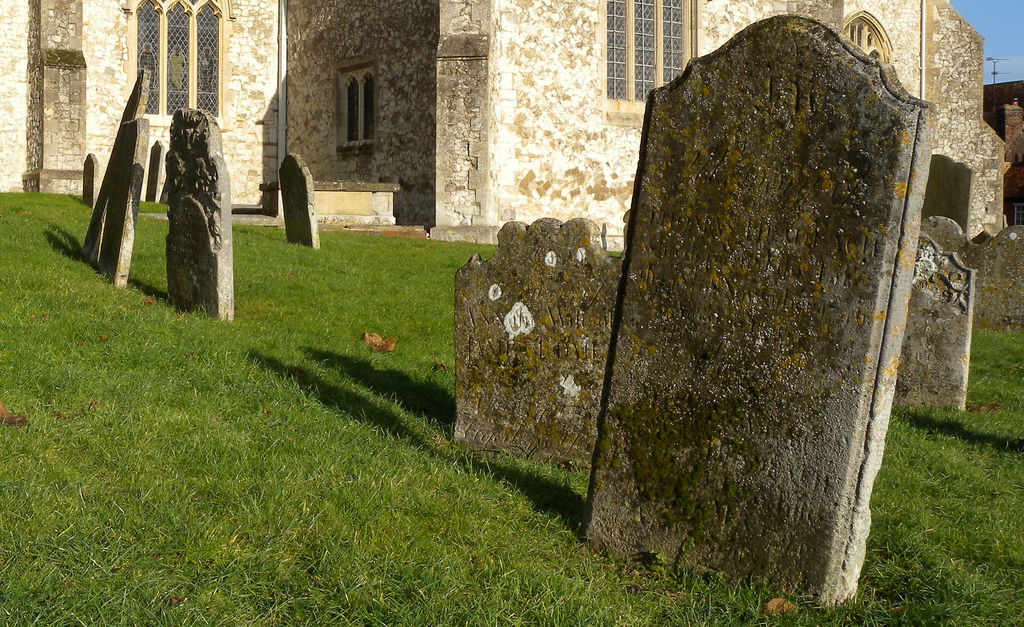
Above: Acclaim wanted to buy advertising space on gravestones for Shadowman 2.
10) A brass knuckle surprise
Electronic Arts sent out brass knuckles to game journalists as part of its promotional kit for The Godfather II back in 2009. Gaming site Game Politics broke the story, pointing out that these are actually illegal items in its state, Pennsylvania.
Not long after, EA employees started phoning round asking these same journalists to send the brass knuckles back. “I hope you’re enjoying our Godfather II press kit, including the novelty brass knuckles,” went the official line. “To help you take proper care to dispose of the item, we’re sending you a pre-paid shipping package.”
11) Acclaim supports speeding motorists
Prior to the 2002 U.K. launch of PlayStation 2 racing game Burnout 2: Point of Impact, publisher Acclaim announced it would reimburse the fine accrued by any driver caught speeding on release day.
The U.K. government wasn’t impressed by the plan. “Basically, they are encouraging people to speed and to break the law,” said a spokesman for the Department of Transport. “I just hope for their sakes that none of these people ends up knocking down a child.”
The plan was cancelled before Burnout 2’s release.
12) Sorry, that $25,000 bill isn’t real
Mobile gaming giant Zynga got in trouble back in 2010 when advertising for its crime game Mafia Wars was found plastered all over the streets of San Francisco. Fake $25,000 bills were literally stuck to the sidewalks and Deputy City Attorney Alex Tse cited this as a case of “sidewalk vandalism.”
Advertising agency Davis Elen Advertising eventually took the rap for the stunt, paying a fine of $45,000 for “illegal and actionable” acts.
“The so-called ‘guerilla marketers’ who deface public property in San Francisco may think they’re being clever, but they’re nothing more than lawless vandals-for-hire,” said City Attorney David Herrera. “Graffiti vandalism is illegal, and when it’s done as corporate advertising, it’s also actionable as an unlawful business practice.”
VentureBeat's mission is to be a digital town square for technical decision-makers to gain knowledge about transformative enterprise technology and transact. Learn More
